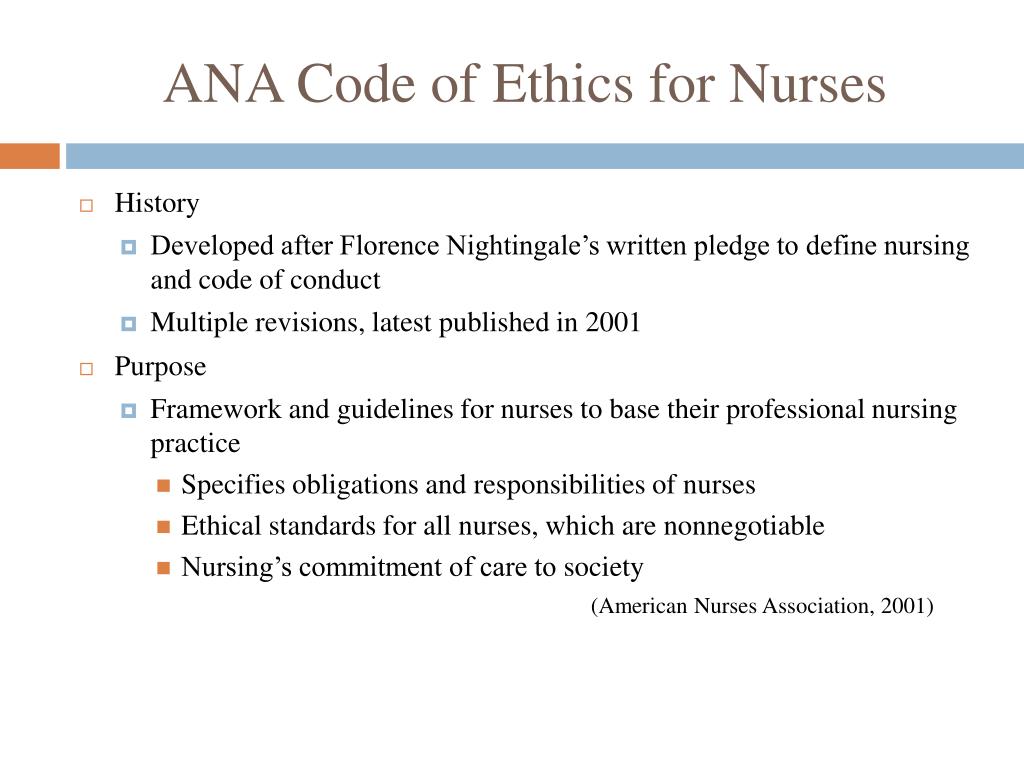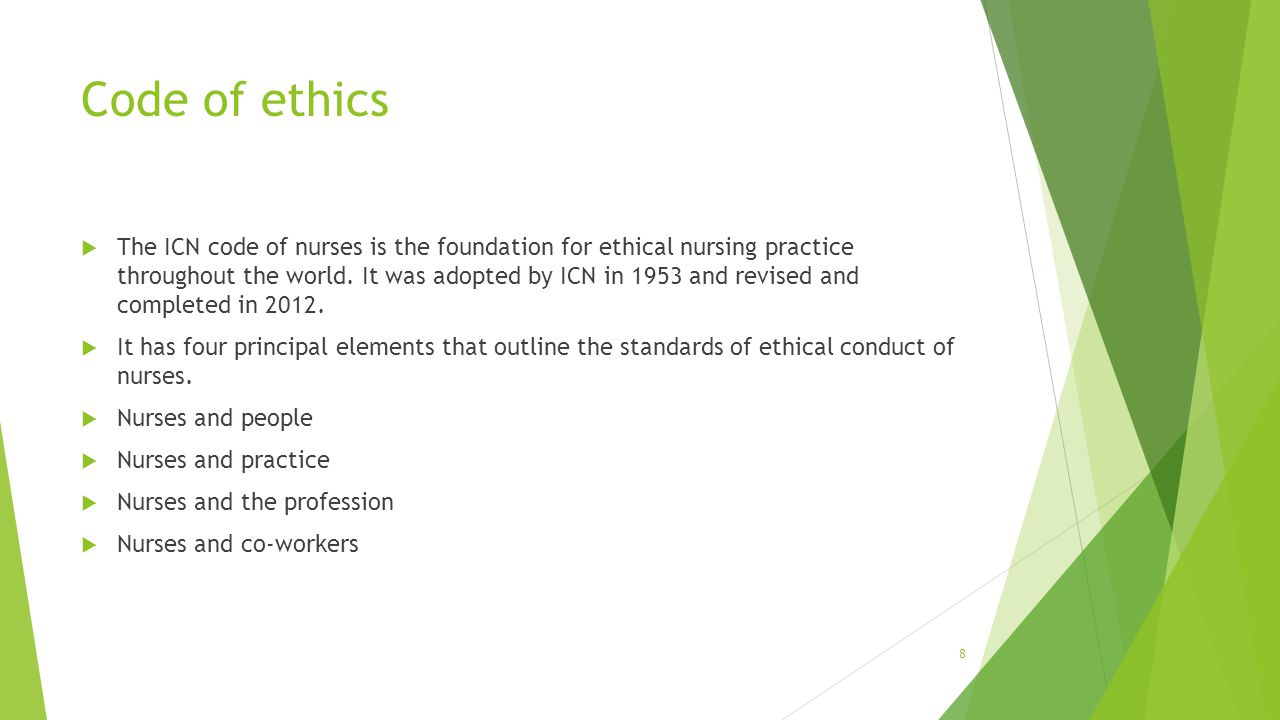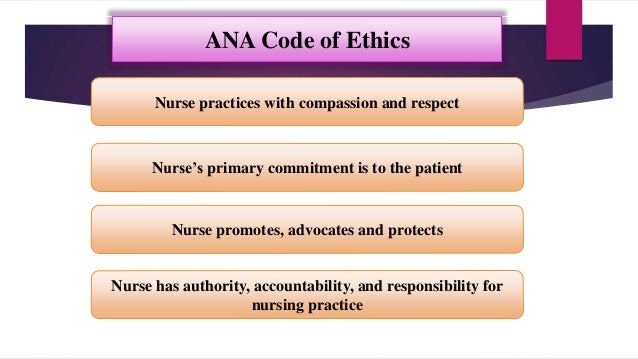Ana Code Of Ethics
ANA Code of Ethics. The nurse practices with compassion and respect for the inherent dignity, worth, and unique attributes of every person. The nurse’s primary commitment is to the patient, whether an individual, family, group, community, or population. — ANA Code of Ethics, Provision 9.4 Rising above politics Some of those issues have become bitter political dividing points, and that may turn nurses off to advocating for change — but the challenge is to rise above the politics and focus on the science, Stokes said. ANA Code of Ethics 2001 Provision 1: The nurse, in all professional relationships, practices with compassion and respect for the inherent dignity, worth, and uniqueness of every individual, unrestricted by considerations of social or economic status, personal attributes, or the nature of health problems Provision 2.
Revision or amendment except by formal process of revision by the American Nurses Association. The Code of Ethics for Nurses arises from within the long, distinguished, and enduring moral tradition of modern nursing in the United States. It is foundational to nursing theory, practice, and praxis in its expression of the values.
Provision 1
The nurse practices with compassion and respect for the inherent dignity, worth, and unique attributes of every person.
Provision 2
The nurse’s primary commitment is to the patient, whether an individual, family, group, community, or population.
Provision 3
The nurse promotes, advocates for, and protects the rights, health, and safety of the patient.
Provision 4
The nurse has authority, accountability, and responsibility for nursing practice; makes decisions; and takes action consistent with the obligation to promote health and to provide optimal care.
Provision 5
The nurse owes the same duties to self as to others, including the responsibility to promote health and safety, preserve wholeness of character and integrity, maintain competence, and continue personal and professional growth.
Provision 6
The nurse, through individual and collective effort, establishes, maintains, and improves the ethical environment of the work setting and conditions of employment that are conducive to safe, quality health care.
Provision 7
The nurse, in all roles and settings, advances the profession through research and scholarly inquiry, professional standards development, and the generation of both nursing and health policy.
Provision 8
The nurse collaborates with other health professionals and the public to protect human rights, promote health diplomacy, and reduce health disparities.
Provision 9
The profession of nursing, collectively through its professional organizations, must articulate nursing values, maintain the integrity of the profession, and integrate principle of social justice into nursing and health policy.
Access the ANA Code of Ethics with Interpretive Statements.
American Nurses Association, Code of Ethics for Nurses with Interpretive Statements, Washington, D.C.: American Nurses Publishing, 2015
Nursing is more than delivering care; it involves patient advocacy as well. Because they have the most direct interaction with patients, nurses are in the ideal position to advocate for each one on an individual basis. The American Nurses Association (ANA) stresses the importance of patient advocacy in its Code of Ethics and lists three core values that form its basis: preserving human dignity, patient equality, and freedom from suffering. This three-part blog series will address each of these core values in turn.
Equality is a much discussed concept, one that has historically been difficult to achieve in practice. It is a concept that is central to many ethical theories, and nursing ethics are no exception. The ANA’s Code of Ethics states that nurses must practice “with compassion and respect for the inherent dignity, worth, and uniqueness of every individual, unrestricted by considerations of social or economic status, personal attributes, or the nature of health problems.” This means all nurses must set aside prejudice or personal bias to care for all patients with the same degree of professionalism, regardless of who that patient is. What’s more, recognizing and promoting patient equality is one of three core values that form the basis of nursing’s patient advocacy role.
In healthcare, patient equality comes down to two main themes: universal human value, and equal access to healthcare resources.


The theme of universal human value relates to the recognition that every life has value. It was highlighted dramatically in the Boston Globe’s coverage of the trauma nurses who cared for the Boston Marathon bombing suspect in 2013, including in this excerpt:
All of the nurses asked by supervisors to care for Tsarnaev agreed, the hospital said. The Globe interviewed seven of them, and all said that the ethical bedrock of their profession requires them to treat patients regardless of their personal history. They are sometimes called upon to nurse drunk drivers, prisoners, gang members, but this assignment was the ultimate test of Florence Nightingale’s founding ideals.
TheGlobe also reported that, “The nurses said they were proud of the care they provided the suspected bomber, whose condition steadily improved, and of their role in preparing him to face justice.”
These nurses were able to overcome their ambivalence about caring for the bombing suspect in order to do their jobs with skill, professionalism, and even compassion, as they provided comfort and pain relief in a difficult situation. They truly promoted the principle of patient equality, despite the circumstances.

The other side of patient equality has to do with our healthcare system itself, which is prone to disparities in the way care is delivered and who has access to high-quality care. According to the Institute of Medicine (IOM), “a large body of published research reveals that racial and ethnic minorities experience a lower quality of health services, and are less likely to receive even routine medical procedures than are White Americans.” The Centers for Disease Control and Prevention report on Health Disparities and Inequalities found that mortality rates from various chronic illnesses were all higher for certain minority populations. For example, while African-American women develop breast cancer at lower rates than white women, they are more likely to die from their disease. Disparities exist for ethnic populations due to factors that may include: social isolation, socioeconomic status, discrimination, language/cultural barriers, and environmental factors, among others.
Ana Code Of Ethics Provisions
Nurses have a long history of caring for underserved and vulnerable populations, and this should continue—but with a focus on practices that may help to end disparities. Cultural competency can go a long way in helping minority patients overcome barriers that stand in their way of receiving excellent care, particularly for nurse case managers and oncological nurse navigators, who are trained to look for and overcome barriers to care. Yet even bedside nurses can advocate for underserved patients in a myriad of ways. Ideally, every patient should receive the same quality of care regardless of ethnicity, religion, sexual orientation, education, or income.
Can you deliver culturally competent care? Do you want to make a difference in the lives of your patients? Empower yourself with knowledge through an online RN to BSN or RN to BSN/MSN degree. American Sentinel University is an innovative, accredited provider of online nursing degrees.
Have you dreamed of earning your BSN, MSN or DNP? With American Sentinel, you can make that dream a reality.
Learn what American Sentinel has to offer:

Let us answer any questions you have. Fill out the form below, and we will be in touch quickly.
Ana Code Of Ethics 4
